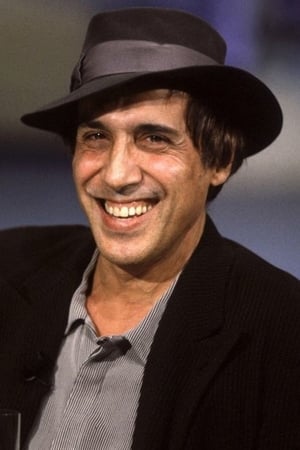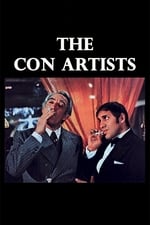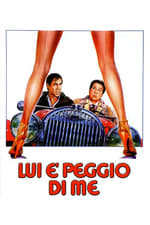Información personal
Nombre artístico Adriano Celentano
Conocido por Interpretación
Créditos conocidos 67
Sexo Masculino
Fecha de nacimiento 6 de enero de 1938 (87 años)
Lugar de nacimiento Милано, Италия
También conocido como
- Il Molleggiato
- Адриано Челентано
- آدریانو چلنتانو
Puntuación del contenido
100
¡Sí! ¡Buena pinta!
Iniciar sesión para informar de un problema
Biografía
Adriano Celentano (born 6 January 1938) is an Italian musician, singer, composer, actor, and filmmaker. He is dubbed il Molleggiato (the springy one) because of his dancing.
Celentano's many albums frequently enjoyed both commercial and critical success. With 150 million records sold worldwide, he is one of the best-selling Italian musical artists. Often credited as the author of both the music and lyrics of his songs, according to his wife Claudia Mori, some were written in collaboration with others. Due to his prolific career, both in Italy and abroad, he is considered one of the pillars of Italian music. Celentano is recognized for being particularly perceptive of changes in the music business, and is credited for having introduced rock and roll to Italy. As an actor, Celentano has appeared in 39 films, mostly comedies.
Celentano was born in Milan at 14 Via Cristoforo Gluck, and this address later became the subject of the famous song "Il ragazzo della via Gluck" ("The boy from Gluck Street"). His parents were from Foggia in Apulia and had moved north for work. His career as a singer started in 1959. Before his debut as an artist he was working as a watchmaker.
Heavily influenced by Elvis Presley and the 1950s rock 'n' roll scene as well as by American actor Jerry Lewis, Celentano started playing in a rock and roll band with Giorgio Gaber and Enzo Jannacci. Along with Gaber and Jannacci, he was discovered by Jolly Records A&R Executive Ezio Leoni, who signed him to his first recording contract and co-authored with Celentano some of his greatest early hits, including "24.000 baci", "Il tuo bacio è come un rock", and "Si è spento il Sole". He first appeared on screen in Ragazzi del Juke-Box, a 1959 Italian musical film directed by Lucio Fulci with music by Ezio Leoni. In 1960, Federico Fellini cast him as a rock and roll singer in his film La Dolce Vita.
In 1962, Celentano founded the Italian record label Clan Celentano (which is still active) with many performers such as Don Backy, Ola & the Janglers, Ricky Gianco, Katty Line, Gino Santercole, Fred Bongusto and his wife Claudia Mori.
As a film director, Celentano frequently cast Ornella Muti, Eleonora Giorgi and his wife Claudia Mori. He and Mori have three children, Rosita, Giacomo and Rosalinda Celentano. Rosalinda is most notable to worldwide audiences for playing Satan in Mel Gibson's The Passion of the Christ. Celentano has also hosted several Italian television shows.
Celentano has retained his popularity in Italy for over 50 years, selling millions of records and appearing in numerous TV shows and movies. As part of his TV and movie work, he created a comic genre, with a characteristic walk and facial expressions. For the most part, his films were commercially successful; indeed, in the 1970s and part of the 1980s, his low-budget movies were top of Italian box office rankings. As an actor, critics point to Serafino (1968), directed by Pietro Germi, as his best performance. ...
Source: Article "Adriano Celentano" from Wikipedia in English, licensed under CC-BY-SA 3.0.
Adriano Celentano (born 6 January 1938) is an Italian musician, singer, composer, actor, and filmmaker. He is dubbed il Molleggiato (the springy one) because of his dancing.
Celentano's many albums frequently enjoyed both commercial and critical success. With 150 million records sold worldwide, he is one of the best-selling Italian musical artists. Often credited as the author of both the music and lyrics of his songs, according to his wife Claudia Mori, some were written in collaboration with others. Due to his prolific career, both in Italy and abroad, he is considered one of the pillars of Italian music. Celentano is recognized for being particularly perceptive of changes in the music business, and is credited for having introduced rock and roll to Italy. As an actor, Celentano has appeared in 39 films, mostly comedies.
Celentano was born in Milan at 14 Via Cristoforo Gluck, and this address later became the subject of the famous song "Il ragazzo della via Gluck" ("The boy from Gluck Street"). His parents were from Foggia in Apulia and had moved north for work. His career as a singer started in 1959. Before his debut as an artist he was working as a watchmaker.
Heavily influenced by Elvis Presley and the 1950s rock 'n' roll scene as well as by American actor Jerry Lewis, Celentano started playing in a rock and roll band with Giorgio Gaber and Enzo Jannacci. Along with Gaber and Jannacci, he was discovered by Jolly Records A&R Executive Ezio Leoni, who signed him to his first recording contract and co-authored with Celentano some of his greatest early hits, including "24.000 baci", "Il tuo bacio è come un rock", and "Si è spento il Sole". He first appeared on screen in Ragazzi del Juke-Box, a 1959 Italian musical film directed by Lucio Fulci with music by Ezio Leoni. In 1960, Federico Fellini cast him as a rock and roll singer in his film La Dolce Vita.
In 1962, Celentano founded the Italian record label Clan Celentano (which is still active) with many performers such as Don Backy, Ola & the Janglers, Ricky Gianco, Katty Line, Gino Santercole, Fred Bongusto and his wife Claudia Mori.
As a film director, Celentano frequently cast Ornella Muti, Eleonora Giorgi and his wife Claudia Mori. He and Mori have three children, Rosita, Giacomo and Rosalinda Celentano. Rosalinda is most notable to worldwide audiences for playing Satan in Mel Gibson's The Passion of the Christ. Celentano has also hosted several Italian television shows.
Celentano has retained his popularity in Italy for over 50 years, selling millions of records and appearing in numerous TV shows and movies. As part of his TV and movie work, he created a comic genre, with a characteristic walk and facial expressions. For the most part, his films were commercially successful; indeed, in the 1970s and part of the 1980s, his low-budget movies were top of Italian box office rankings. As an actor, critics point to Serafino (1968), directed by Pietro Germi, as his best performance. ...
Source: Article "Adriano Celentano" from Wikipedia in English, licensed under CC-BY-SA 3.0.
Interpretación
|
||||||||||||
|
||||||||||||
|
||||||||||||
|
||||||||||||
|
||||||||||||
|
||||||||||||
|
||||||||||||
|
||||||||||||
|
||||||||||||
|
||||||||||||
|
||||||||||||
|
||||||||||||
|
||||||||||||
|
||||||||||||
|
||||||||||||
|
||||||||||||
|
||||||||||||
|
||||||||||||
|
||||||||||||
|
||||||||||||
|
||||||||||||
|
||||||||||||
|
||||||||||||
|
||||||||||||
|
||||||||||||
|
||||||||||||
|
||||||||||||
|
||||||||||||
|
||||||||||||
|
||||||||||||
|
||||||||||||
|
Guion
|
|||
|
|||
|
|||
|
|||
|
|||
|
Sonido
|
|||
|
|||
|
|||
|
Dirección
|
|||
|
|||
|
|||
|
|||
|
|||
|
Edición
|
|||
|
|||
|
|||
|
Creador
|
|||
|
Equipo
|
Producción
|
|||
|








